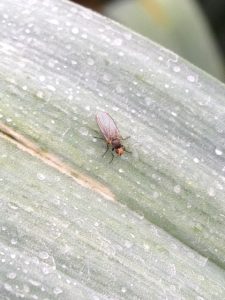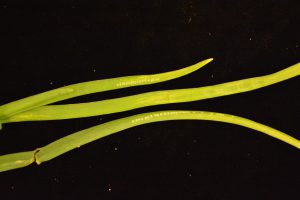Vegetable Crops Edition
Seasonal updates and alerts on insects, diseases, and weeds impacting vegetable crops. New Jersey Commercial Vegetable Production Recommendations updates between annual publication issues are included.
Subscriptions are available via EMAIL and RSS.
Quick Links:
 NJ Commercial Vegetable Production Recommendations
NJ Commercial Vegetable Production Recommendations
 Rutgers Weather Forecasting - Meteorological Information important to commercial agriculture.
Rutgers Weather Forecasting - Meteorological Information important to commercial agriculture.
In-Person Pesticide Exams for April
The 2022 Census of Agriculture – There’s Still Time To Be Counted!
New Jersey farmers still have time to be counted in the 2022 Census of Agriculture, according to the U.S. Department of Agriculture’s (USDA) National Agricultural Statistics Service (NASS). Although the deadline for submitting the ag census has just passed, NASS will continue to accept completed census questionnaires through the spring to ensure all farmers and ranchers take advantage of the opportunity to be represented in the widely used data.
“My sincere appreciation goes to producers who have already completed the census. We want to partner with New Jersey producers to show the importance of New Jersey agriculture,” said NASS New Jersey State Statistician Bruce Eklund. “There is strength in numbers. The time to do your part is now. There is still time for farmers to respond.”
NASS will continue to follow up with producers throughout the spring with mailings, phone calls, and personal visits. Farmers and ranchers are encouraged to complete their ag census either online at agcounts.usda.gov or by mail as soon as possible.
Federal law under Title 7 USC 2204(g) Public Law 105-113 mandates that everyone who received the 2022 Census of Agriculture questionnaire complete and return it, even if they are not currently farming. The same law requires NASS to keep all submissions confidential, use the information for statistical purposes only, and publish aggregate data to prevent disclosing the identity of any individual producer or farm operation.
If you need a survey code or questionnaire, please contact the USDA, NASS Northeastern Regional Field Office, 4050 Crums Mill Rd., Suite 203, Harrisburg, PA 17112; Phone – 717-787-3904; eFax – 1-855-270-2719; or Email – nassrfoner@usda.gov.
NASS will release the results of the ag census in early 2024. To learn more about the Census of Agriculture, visit nass.usda.gov/AgCensus. On the website, producers and other data users can access frequently asked questions, past ag census data, special study information, and more. For highlights of these and the latest information, follow USDA NASS on Twitter at @usda_nass.
NASS is the federal statistical agency responsible for producing official data about U.S. agriculture and is committed to providing timely, accurate, and useful statistics in service to U.S. agriculture. USDA is an equal opportunity provider, employer, and lender.
2023 Pre-Season Farm Labor Meetings to be Held Soon
Sponsored by NJ Farm Bureau and Rutgers NJAES Cooperative Extension, two opportunities for farmers to learn about seasonal updates for farm labor will take place at two different locations. See below:
When: Wednesday, March 22, 7-9pm
Where: Cumberland County Rutgers Cooperative Extension Office, 291 Morton Ave., Millville, NJ
When: Thursday, March 30, 7-9pm
Where: Atlantic County Rutgers Cooperative Extension Office, 6260 Old Harding Highway, Mays Landing, NJ 08360
These meeting will consist of presentations on regulations pertaining to farm labor. The presenters will be from the Department of Labor, NJ DEP Pesticide Control Program, and NJFB. The topics discussed will be as follows. This will be an opportunity to ask any questions you may have going into the growing season.
• Worker Protection Standards Overview of new EPA WPS rules-NJ DEP Bureau of Pesticide Control
• Federal Labor Regulations Update & Overview of MSPA, FLSA and transportation -US Dept. of Labor
• NJ Labor Regulations Update & Overview Wage and Hour and paid sick leave -NJ Dept. of Labor
• Farm Bureau update
NJ DEP Licensed Pesticide Applicators can receive 1 CORE Recertification Credit for attending this event.
For additional information contact: Ben Casella, New Jersey Farm Bureau, 609-393-7163
Allium leaf miner update: 03/09/23
Allium Leaf Miner (ALM)
Allium leaf miner feeding and egg laying injury was reported on chives in southern Cape May County on Thursday. The West Cape May weather station (closest station) has recorded 295 growing degree days (GDD) base 39˚F as of Thursday. 39˚F is close to the lower developmental temperature (38.3˚ F) which our colleagues at Penn State recommend for predicting the first emergence of ALM adults. 295 GDD at this temperature is in excess of the 250 GDD base 38.3˚ F that is the threshold for adult emergence and activity. In recent years, initial feeding/egg laying scars have been detected within a few days of local weather stations recording the 250 GDD threshold. Growers who feel they may be impacted by this pest should check the accumulated GDD from local weather stations. Growers in southern counties may reasonably assume there will be ALM activity in their area soon, if not already happening. To determine GDD from local weather stations, the NEWA website https://newa.cornell.edu/ is very helpful. From the NEWA home screen, select the nearest weather station from drop down menu at the center of the page. Next, scroll down to “Weather Tools” on the right side of the page, and select “DD Calculator”. Select your start date (1/01/23) and end date as well as Degree Day Type (39 F) from the menu at the left of the page. The site will automatically generate the accumulated GDD base 39F to the last day of your requested sample, and then offer a forecast of accumulated GDD for the next week.
Growers should consider initiating the control method of their choice at this time. Affected crops include chives, scallions, garlic, onions and leeks. Look for neat rows of white spots descending from the upper tips of allium leaves (see photo at left). Initial injury often occurs on the tallest leaves. Under warmer, less breezy conditions, adults may be seen near the tips of leaves (see photo of adult at lower right).
Floating row covers, kept on until this flight ends will help minimize access to plants. Insecticide applications targeting adults may be helpful as well, although frequency of applications is uncertain. Spinosyn materials (Radiant, Entrust (OMRI approved)), pyrethroids (Mustang Maxx,  Warrior), neonicotinoids (Scorpion, Venom), the diamide Exirel (section 2ee recommendation) and the insect growth regulator Trigard are labeled for miner control.
Warrior), neonicotinoids (Scorpion, Venom), the diamide Exirel (section 2ee recommendation) and the insect growth regulator Trigard are labeled for miner control.
Adult activity and observations of feeding will be reported on in the IPM Update as they occur.
NJDEP Bureau of Water Allocation and Well Permitting Workshops Held
The New Jersey Department of Environmental Protection coordinated workshops in the past two weeks to assist farmers with Agricultural Water Certifications/Registrations who needed 5-year renewals. Those farmers with certifications expiring in 2023 were invited by NJDEP to attend the scheduled workshops. NJDEP Staff visited the 4 counties: Gloucester, Salem, Burlington, and Cumberland to complete renewals for 2023. These workshops are an efficient way to make sure forms are accurate, complete, and acceptable to NJDEP – avoiding the need to mail back paperwork to correct any information. If a farmer receives an invitation in the future to attend these NJDEP coordinated workshops, it is really important to attend and update your forms.
If a farmer was unable to attend workshops, or their county did not have a workshop, they must complete the 5-year renewal form mailed by DEP and make an appointment with the County Agricultural Agent in their county to finalize the forms in order to keep their status current. County Agricultural Agents do not have access to obtaining the renewal packets and farmers must bring them completed to the appointment or contact NJDEP for another copy, if they cannot locate their copy.
As per the NJDEP’s instruction, Agricultural Agents are to complete an “agent irrigation calculations sheet” and sign off on the form prior the forms are submitted to DEP. The forms can also be reviewed during an appointment with the Agricultural Agent. All other portions of the form are the responsibility of the farmer to complete. Also, it is important to read all instructions – that includes having a written daily log of the last month water was used in the past year to submit with the 5-year renewal application.
If a farmer does not have an Agricultural Water Use Certification or Registration, they can contact the NJDEP using the information below to obtain the forms.
If a farmer has any questions, NJDEP asks they contact staff at:
NJ Department of Environmental Protection, Division of Water Supply and Geoscience, Bureau of Water Allocation and Well Permitting, Mail Code 401-04Q, P.O. Box 420, Trenton, NJ 08625-0420, 609-984-6831. Also see the website at http://www.nj.gov/dep/watersupply/

